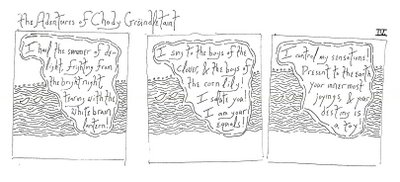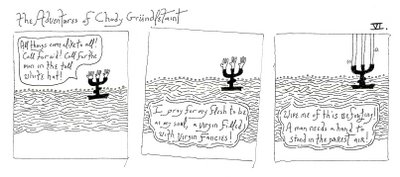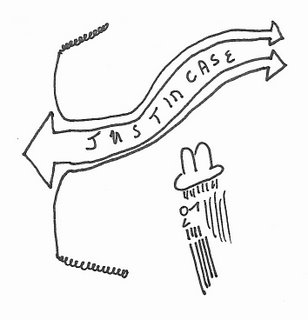Attn: General James E. Cartwright
Chief of Staff, United States Strategic Command
I refuse to believe that you would consider spending half a billion dollars on a program that could put our country at risk of a 21st Century Nuclear War. What on earth could you be thinking? Do you folks need constant reminding that there are millions of people starving in the world, not exclusively outside of America, & we are incessantly edging closer to some serious environmental dangers. Yet you persist to act like little boys playing with big, unhealthy toys. In a Christian nation, you are ignoring a huge moral necessity.
Sincerely,
James Welsch
May 29, 2006
E-mail: Angry Letter to Gen. Cartwright
May 27, 2006
List
2) Snow in May.
3) The 1976 elections.
4) Neil Diamond’s "Soulimon".
5) What Hawthorne thought of Melville.
6) A googly during a Sticky Wicket.
7) The deleted ending of Dr. Strangelove.
8) Popcorn cooked over a fire.
9) When, during the last Calvin & Hobbes anthology, Rosalyn (the babysitter) beats Calvin at Calvinball.
10) David Byrne dancing with a lamp.
11) White tea with steamed rice milk.
12) Turquoise found in the hills of the Nevada desert.
13) New York hipster drone music played at deafening volumes on the Hurdy-Gurdy.
14) Good flan.
15) Lily Langtree.
16) The names of Al Franken’s books.
17) Half Moon Lake in Desolation Wilderness.
18) Petzl Headlamps worn at inappropriate times.
19) J.D. Salinger’s longevity.
20) People who smile to themselves at you.
21) Joan Baez singing both parts of conversational songs.
22) Jokes about Sven & Ollie.
23) People who are humble about having read all of Edmund Spenser’s The Faerie Queen.
24) Sexagenarians who think The Man Who Wasn't There is the best Cohen Brothers movie.
25) Poor students who would prefer to spend more than $50 on a bottle of good tequila.
26) Mimosa’s Witnesses.
27) My friend who said she saw Wagner’s Siegfried on acid with her father.
28) John Denver’s Greatest Hits, Volume Three.
29) Children who use the word “obtuse.”
30) Life-long vegetarians.
31) Tan M&Ms in a wine glass.
32) Toughannock Falls.
33) The first few chapters of First Chronicles.
34) Houris.
35) When Elizabeth Bishop interrupts & corrects herself in her own poem.
36) Seeing an old friend in a new light.
37) Having a large number of dimes.
38) Jokes about what’s black, white, and/or red.
39) Corn Lily.
40) Shakespeare’s Troilus & Cressida.
41) Butterbeer & Firewhiskey.
42) Caleb Burhans.
43) Merlot drinkers.
44) People who take black & white photos on digital cameras.
45) Jimmy Buffet’s Jamaica Mistaica.
46) Reading Robert Burns out loud with an American accent.
47) Christmas caroling on Halloween.
48) The one who gets to play 4’33” during a John Cage Music Circus.
49) David Bowie as Andy Warhol in Basquiat.
50) Eskimo women chanting.
May 19, 2006
Conversations about Music
I was playing "mellow background guitar music" for the below mentioned "Healthy Living for Women" conference last Saturday night, & it was my second set of songs (Thursday night was ninety minutes of love longs, Saturday was all over the map. It included the song "Are you washed in the blood of the lamb?", which led one guest to ask "You just played that to see if anybody was paying attention?") In the middle of my groovy rendition of the song "First we take Manhattan, then we take New York", a lady approached me & began speaking to me, as if anyone singing a song is also fully capable of having a conversation.
Lady: You're James Welsch! I saw your name on the thing! Did you know that there is also a famous author named "James Welch," except he spells it differently. You spell it "s-c-h" don't you?
Me: Yeah, I don't know why it's spelled that way.
Lady: My mother is an English teacher, & she thinks that James Welch is the greatest writer of the second half of the Twentieth Century. Do you know who she thinks is the greatest author of the first half?
Me: Who?
Lady: William Faulkner
Me: I've never read either of them.
Lady: Oh, you should really read "The Heartsong of Charging Elk." My mother assigns it in her [blah blah blah]
[At this point, I attempt to resume the song in the middle of the fourth verse, at "I don't like those drugs that keep you thin..." - there are six verses total.]
Lady: Say, does that song happen to be an original composition?
Me: No, it's by Leonard Cohen.
Lady: Leonard Cohen! Really! The poet? You know, I once had a date with Leonard Cohen in 1959 in New York City! You know, that sounds like his type of poetry.
Me: He's a pretty famous songwriter.
Lady: Is that what he ended up doing? Well, it's nice to know what became of him. Leonard Cohen! huh!
______________________________________________________________________________________________________________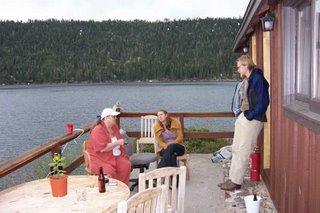 My mother visited me at the point & took some pictures on a rainy day. She was complaining bitterly that I had logged onto her NetFlix account & added Sam Amidon as her "friend". Sam, my roommate in college, is a fiddler, folk singer, & has an ecclectic taste in films. She complained that she keeps getting e-mails telling her what Sam is watching, which she could care less about. However, I found this list amazing:
My mother visited me at the point & took some pictures on a rainy day. She was complaining bitterly that I had logged onto her NetFlix account & added Sam Amidon as her "friend". Sam, my roommate in college, is a fiddler, folk singer, & has an ecclectic taste in films. She complained that she keeps getting e-mails telling her what Sam is watching, which she could care less about. However, I found this list amazing:
Movies that both Sue & Sam liked: Castle in the Sky, Love Actually.
Movies that both Sue & Sam didn't like: Crash.
May 13, 2006
Mountain Ukulele Frequently Asked Questions
Today, I will be instructing a short class in Introductory Mountain Ukulele Playing to the "Healthy Living for Women" conference. The class will be held out on the ski dock, last approximately one hour, during which time I hope to get them all up to the level to play John Denver's classic "Rocky Mountain High". I am posting here the FAQs from my handout.
Q: Can I have this ukulele?
A: No. They were the generous gift of Helen Bing to the Stanford Sierra Camp, donated presumably for classes such as these. However, there are usually one or two ukuleles for sale at any guitar store ($20-50ish), although they are often bad quality. I do not recommend buying ukuleles from eBay, because I once got one that didn’t work. Your best bet for a nice one is some kooky used instrument store run by an old hippie. There are some cool instrument makers in the U.S., such as Maple Leaf Music in Brattleboro, Vermont, who are making good ukuleles.
Q: What is a ukulele?
A: Most of the members of the guitar family originate from Spain or Portugal, descendants of Turkish & Middle Eastern instruments. The ukulele was developed in the 1880s in Hawaii as a combination of the Madeiran Portuguese braguinha and raja. Its name roughly means “leaping flea”. There was a brief rave for it in the Continental United States during the Tiki-obsessed 1940s & 50s. Since then, it has been played mainly in mountainous regions such as the Sierra Nevada & John Denver-loving Colorado Rockies.
Q: How was the Mountain Ukulele Style developed?
A: Harry Smith, whilst compiling the Anthology of American Folk Music, found several old Appalachian recordings with instruments sounding like a ukulele, which he chose not to include in his famous collection. He proposed that the rapidly-strummed instrument on “Corn whiskey’s a-gone, so let’s transubstantiate, ma!” was some variety of saucepan mandolina with wimpy strings. I have my own theories about nomadic Polynesians, which remain difficult to corroborate with the facts. The recent resurgence of mountainous ukulele playing has been hard to account for, except that skiers & hikers prefer this inexpensive, light-weight instrument for its impressive convenience.
May 10, 2006
Music Review: In Defense of “Hey, Mr. Tambourine Man”
Since childhood, I have been told that this song is about drugs. I fear that since its creation, people have been understanding it as if it were “Hotel California”. It is most certainly not about drugs. It is about life & art.
May 07, 2006
Two Fake Poems, imagined during a slow Fountain Shift
 The second poem is actually a short story written in very beautiful, metered prose, a poem in disguise. A man has bought a country house, an old farmhouse near the mountains, which lacks a deck. Thinking that a deck is essential for the contemplation of the mountains, he builds one to the north, despite the poo-pooing of his neighbors, whose decks all face the south. There he sits, despite the season or weather, & finds a fairy-like gleam on one mountain peak. He then decides to investigate the mystic glow, & poetically describes all of the boring flora & fauna on his hike. At the top, there is a sad girl in a cottage who spends her time hating her beautiful life & wondering who lives in the farmhouse that looks up at her. Is it the poet from the first poem? What's she doing up in that mountain? If she's so unhappy in her reclusion, why doesn't she leave? Why doesn't the man tell her that he's the one who lives in the farmhouse with the deck?
The second poem is actually a short story written in very beautiful, metered prose, a poem in disguise. A man has bought a country house, an old farmhouse near the mountains, which lacks a deck. Thinking that a deck is essential for the contemplation of the mountains, he builds one to the north, despite the poo-pooing of his neighbors, whose decks all face the south. There he sits, despite the season or weather, & finds a fairy-like gleam on one mountain peak. He then decides to investigate the mystic glow, & poetically describes all of the boring flora & fauna on his hike. At the top, there is a sad girl in a cottage who spends her time hating her beautiful life & wondering who lives in the farmhouse that looks up at her. Is it the poet from the first poem? What's she doing up in that mountain? If she's so unhappy in her reclusion, why doesn't she leave? Why doesn't the man tell her that he's the one who lives in the farmhouse with the deck?I would never suggest that anyone write either of these two short poems, but could there be a way to insert a little reason or inter-relatedness into any of this detailed but meaningless imagery? Have all Americans done since the inception of their Literature is describe what a nice country we have in which to take boring walks & notice things? This sort of written behavior should have died with Wordsworth & his gay followers. Get up off of your deck, man, & go sailing or get a job or study theological twists or something. You know who you are!
May 05, 2006
The Adventures of Chody Gründletaint I-III
But it will probably be quite some time before I can upload them again.
If it is too small, click on the image to enlarge it.

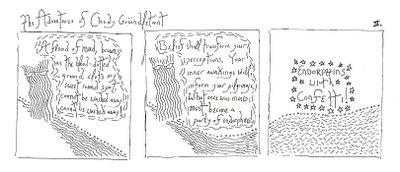

May 04, 2006
From the Archive (2003): "The Arabian Bird" Supplementary Poetry
That the turtle saw his right
Flaming in the Phoenix’ sight.
Either was the other’s mine.
Property was thus appalled
That the self was not the same.
Single nature’s double name
Neither two nor one was called.
-William Shakespeare, The Phoenix & the Turtle
I.
When the blank sky that only the West can muster
Inveterates the yellow wilderness,
At that core point where soul & body kiss,
I met a sage drifting across the dune.
The particulars of beauty that ooze through the fog –
Though the pylon’s shadow lurked in front of us,
He supposed nor back nor toward would reach home soon –
As definitions, directions sweltering in a bog –
All read like scribbles melting on a cracking rune.
Indeed, quoth he, the origin would be comfortable,
But upon returning, the traveler would have emerged from the boy who left.
II.
The crossword loosely concealed her tight white blouse:
What if the origin was not in itself an extreme,
& there the sage split like to a succubus
Which violates the exclusive interiority of a dream.
I was feeling inertial, still & still traveling,
My canoe elongating toward the odors of life unto life
& death unto death, the ocean & the head,
Or as Narcissus & Echo,
Mirroring love & woe,
Enjoying recycling sensations of marital strife.
The mosquito biteth, flesh itcheth, & Man must scratch,
To the exclusive renewal of blood unto blood;
The mind it reasoneth, head calleth, the soul unhatch:
Is moderation indifference,
Or harmony satiation,
Or, as it is written, Everything is good.
III.
The Elephant & Areopagite rose as I descended,
As ultraviolet cinquefoil
Bleeding from the fecund soil,
A soundless shell.
Behind the bedded bar the counterfeit tender
(Whose story had ended
Outside of this hell)
Recorked all the bottles as if on his death it depended:
O Dennis!
Who knows not Dennis?
Now all the world shall know
Why you are called Pseu-do.
The dissimilar metaphors of pure aromas,
Not for the sake of art,
You silent fart,
Assault the senses as a bride esteems her echo
In a looking-glass, her bridegroom’s spirit behind,
Representations of a conceptual diffusion.
To describe these aromas as floral –
Although intoxicating atomizers imitate their artist –
Runs risk of visualizing the source as the image.
If the difference between poison & medicine is the percentage,
Then where is the dividing line,
He ope’d the register as beauty’s portion measured to his fine:
O Pseudo-Dennis!
Who knows not Dennis?
Now all the world shall know
That what it does not know
Is what it knows.
IV.
The paint that parted the front doors
Concurrently clotted & enhanced its facial canvas:
Isn’t ecstasy the intense moment wrought by love’s extremity.
Her crimson slip was elegant,
But it was not what it obscured,
Like rain, grave at the floor of Fortune’s wheel,
O’er-eager to evaporate, & shed its ocean salt & silt,
Begin again at water’s head, & flow down to its heel.
Her platinum links cascaded like moonlit falls.
Her deep peach skin presented & prevented,
As rising salmon, dams; or Mongols, walls,
Unpossible from North to South, yet visible from space.
But there beyond those seashell eyes, beyond that weathered kilt,
I felt the deeper perfume that the prophet reinvented,
& I knew ten thousand more tomorrows that Time left me, just in case.
IX.
I want to smoke with you Jesus Christ.
I want to pass the proboscis of the nargileh
Between me & you & all the saints & martyrs,
(Especially the visionary teenage girls like Perpetua & Felicitas,
& also especially Ignatius because he’s so damned witty).
We would see the electricity of the campfire
Be orphically mysticized by our fumy exhalings,
But I wouldn’t care, because my savior would sit beside me,
A fat Havana dripping from his lips as he lectured softly:
I give to thee a purer smoke, sans briar,
Although that cigarillo’s also good,
For in it you shall find parts of my fire,
As even dormice bleed grains of my blood.
W.C. Fields once said:
Did I ever tell you about the time,
When we were hiking through the mountains of Lebanon,
& we couldn’t find a corkscrew,
So we had to survive on food & water.
